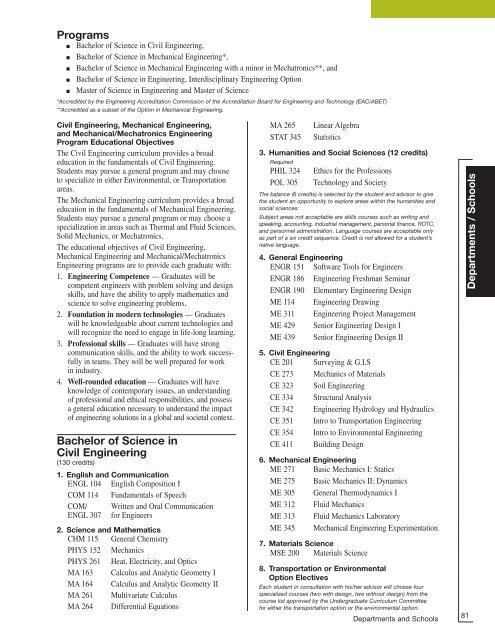ACADEMIC CATALOG - Purdue University Calumet
ACADEMIC CATALOG - Purdue University Calumet
ACADEMIC CATALOG - Purdue University Calumet
You also want an ePaper? Increase the reach of your titles
YUMPU automatically turns print PDFs into web optimized ePapers that Google loves.
Programs<br />
Bachelor of Science in Civil Engineering,<br />
Bachelor of Science in Mechanical Engineering*,<br />
Bachelor of Science in Mechanical Engineering with a minor in Mechatronics**, and<br />
Bachelor of Science in Engineering, Interdisciplinary Engineering Option<br />
Master of Science in Engineering and Master of Science<br />
*Accredited by the Engineering Accreditation Commission of the Accreditation Board for Engineering and Technology (EAC/ABET)<br />
**Accredited as a subset of the Option in Mechanical Engineering.<br />
Civil Engineering, Mechanical Engineering,<br />
and Mechanical/Mechatronics Engineering<br />
Program Educational Objectives<br />
The Civil Engineering curriculum provides a broad<br />
education in the fundamentals of Civil Engineering.<br />
Students may pursue a general program and may choose<br />
to specialize in either Environmental, or Transportation<br />
areas.<br />
The Mechanical Engineering curriculum provides a broad<br />
education in the fundamentals of Mechanical Engineering.<br />
Students may pursue a general program or may choose a<br />
specialization in areas such as Thermal and Fluid Sciences,<br />
Solid Mechanics, or Mechatronics.<br />
The educational objectives of Civil Engineering,<br />
Mechanical Engineering and Mechanical/Mechatronics<br />
Engineering programs are to provide each graduate with:<br />
1. Engineering Competence — Graduates will be<br />
competent engineers with problem solving and design<br />
skills, and have the ability to apply mathematics and<br />
science to solve engineering problems.<br />
2. Foundation in modern technologies — Graduates<br />
will be knowledgeable about current technologies and<br />
will recognize the need to engage in life-long learning.<br />
3. Professional skills — Graduates will have strong<br />
communication skills, and the ability to work successfully<br />
in teams. They will be well prepared for work<br />
in industry.<br />
4. Well-rounded education — Graduates will have<br />
knowledge of contemporary issues, an understanding<br />
of professional and ethical responsibilities, and possess<br />
a general education necessary to understand the impact<br />
of engineering solutions in a global and societal context.<br />
Bachelor of Science in<br />
Civil Engineering<br />
(130 credits)<br />
1. English and Communication<br />
ENGL 104 English Composition I<br />
COM 114 Fundamentals of Speech<br />
COM/ Written and Oral Communication<br />
ENGL 307 for Engineers<br />
2. Science and Mathematics<br />
CHM 115 General Chemistry<br />
PHYS 152 Mechanics<br />
PHYS 261 Heat, Electricity, and Optics<br />
MA 163 Calculus and Analytic Geometry I<br />
MA 164 Calculus and Analytic Geometry II<br />
MA 261 Multivariate Calculus<br />
MA 264 Differential Equations<br />
MA 265<br />
STAT 345<br />
Linear Algebra<br />
Statistics<br />
3. Humanities and Social Sciences (12 credits)<br />
Required<br />
PHIL 324 Ethics for the Professions<br />
POL 305 Technology and Society<br />
The balance (6 credits) is selected by the student and advisor to give<br />
the student an opportunity to explore areas within the humanities and<br />
social sciences:<br />
Subject areas not acceptable are skills courses such as writing and<br />
speaking, accounting, industrial management, personal finance, ROTC,<br />
and personnel administration. Language courses are acceptable only<br />
as part of a six credit sequence. Credit is not allowed for a student’s<br />
native language.<br />
4. General Engineering<br />
ENGR 151 Software Tools for Engineers<br />
ENGR 186 Engineering Freshman Seminar<br />
ENGR 190 Elementary Engineering Design<br />
ME 114 Engineering Drawing<br />
ME 311 Engineering Project Management<br />
ME 429 Senior Engineering Design I<br />
ME 439 Senior Engineering Design II<br />
5. Civil Engineering<br />
CE 201 Surveying & G.I.S<br />
CE 273 Mechanics of Materials<br />
CE 323 Soil Engineering<br />
CE 334 Structural Analysis<br />
CE 342 Engineering Hydrology and Hydraulics<br />
CE 351 Intro to Transportation Engineering<br />
CE 354 Intro to Environmental Engineering<br />
CE 411 Building Design<br />
6. Mechanical Engineering<br />
ME 271 Basic Mechanics I: Statics<br />
ME 275 Basic Mechanics II: Dynamics<br />
ME 305 General Thermodynamics I<br />
ME 312 Fluid Mechanics<br />
ME 313 Fluid Mechanics Laboratory<br />
ME 345 Mechanical Engineering Experimentation<br />
7. Materials Science<br />
MSE 200 Materials Science<br />
8. Transportation or Environmental<br />
Option Electives<br />
Each student in consultation with his/her advisor will choose four<br />
specialized courses (two with design, two without design) from the<br />
course list approved by the Undergraduate Curriculum Committee<br />
for either the transportation option or the environmental option.<br />
Departments and Schools<br />
Departments / Schools<br />
81

















